In the summer term 2016, the new national curriculum was assessed for the first time, with many KS2 pupils undertaking three never-seen-before Science SATs papers: in biology, chemistry, and physics. The newness of these assessments meant that there were simply no past papers that parents could use to help their child with their KS2 Science SATs revision, making the preparation for these exams a daunting task.
However, if your child will be facing these assessments in the summer, you will not face the same fate! We have created some sample questions of our own (modelled on the government sample materials) that will introduce your child to the styles of questions they will face, as well as the subject content itself.
See below for a selection of our KS2 Science SATs sample questions, and get your KS2 Science SATs revision started!
Biology Paper
Question 1
On the left there is a diagram of a stamen (the male part of a plant). On the right is a diagram of a carpel (the female part of a plant).
Label each part of the diagram.

Question 2
Look at this food chain:

- What does the mouse eat?
- What is the producer of this food chain? What does ‘producer’ mean?
- The mouse is the owl’s prey. So, how can we describe the owl?
- Which is the only part of this food chain that is not a consumer?
Question 3
Anil needs your help! He has a list of vertebrate animals that he has seen in the wild, which he wants to classify into groups. He is having trouble with this.
Look at his list of animals and their descriptions and write down whether it is a mammal, amphibian, reptile, bird or fish.
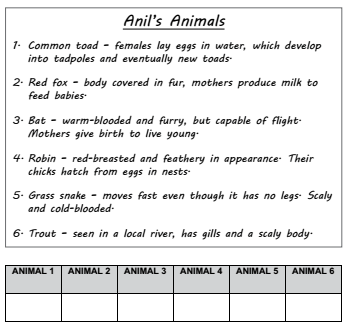

Chemistry Paper
Question 1
Scarlett has made a list of facts about fossils. Unfortunately, Blaze has got his hands on it and has snuck some in that just aren’t true! Defeat Blaze and help Scarlett by deciding who wrote each statement. Choose Scarlett for the TRUE statements and choose Blaze for the FALSE statements.
- Fossils are very rare – conditions have to be perfect for a fossil to form.
- Humans have discovered fossils of modern animals as we see them today.
- Fossils prove the existence of dinosaurs.
- Fossils can give us insight into the diet and behaviour of dinosaurs.
- Humans have discovered every fossil in the world.
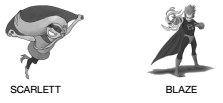




Question 2
Below are three words that describe the process that solids, liquids, and gases go through when changing states. Give a short definition for them.
- Melting:
- Freezing:
- Boiling:
Question 3
Label the following diagram, which shows the three main stages of the water cycle.
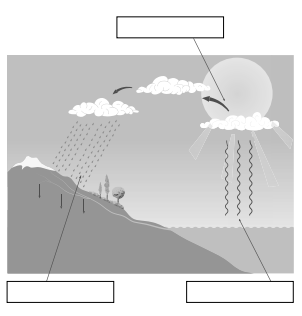

Physics Paper
Question 1
Answer the following questions by writing always, sometimes, or never for each one.
- Earth receives light from the Sun.
- The moon produces light.
- The Sun shines on London.
- You should look directly at the Sun.
- Light travels in straight lines.
- You can see without light.
Question 2
Freddie is playing his trumpet and measuring the amount of decibels he produces with different strength blasts. He records his findings in the following table:

Answer the following questions about Freddie’s test.
- From his results, how do you think Freddie changed his trumpet blasts from 1-3?
- How does increasing the strength of his trumpet blasts affect the number of decibels the trumpet sound produced?
- How does the amount of decibels produced by a sound relate to how loud the sound is?
Question 3
- What happens when the opposite poles of two magnets are near each other?
- What happens when the same poles of two magnets are near each other



Answers
Biology question 1
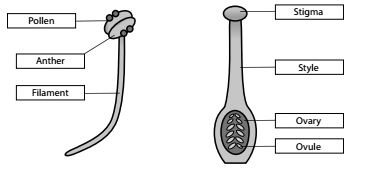
Biology question 2
- The mouse eats the sweetcorn
- The producer of this food chain is the sweetcorn. This means that it does not rely on anything else to produce its food, and is the start of the food chain.
- The owl can be described as a predator
- The only part of this food chain that is not a consumer is the sweetcorn
Biology question 3

Chemistry question 1
- SCARLETT
- BLAZE
- SCARLETT
- SCARLETT
- BLAZE
Chemistry question 2
Melting: ‘Melting’ is the process that solids go through to become liquids. This occurs when a solid is heated enough to reach its ‘melting point’ – the temperature where it can no longer remain as a solid and becomes a liquid.
Freezing: ‘Freezing’ is the process that liquids go through to become solids. This occurs when a liquid is cooled enough to reach its ‘freezing point’ (for water this is 0°C). The freezing point is the temperature at which a liquid will become a solid.
Boiling: ‘Boiling’ is the process that a liquid goes through to become a gas. This occurs when a liquid is heated enough to reach its ‘boiling point’ (for water this is 100°C). The boiling point is the temperature at which a liquid will become a gas.
Chemistry question 3
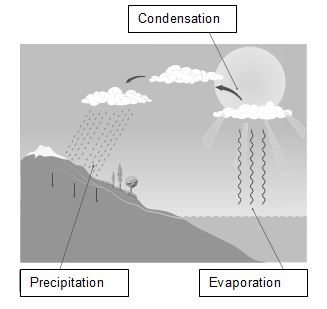
Physics question 1
- Always
- Never
- Sometimes
- Never
- Always
- Never
Physics question 2
- Freddie increased the strength of his trumpet blasts from 1-3. 1 was the softest and 3 was the hardest blast.
- the harder Freddie blew into the trumpet, the more decibels its sound produced.
- The more decibels a sound produces, the louder the sound will be.
Physics question 3
- The magnets will attract towards each other
- The magnets will repel from each other
Thanks for reading our KS2 Science SATs revision blog!

For more KS2 Science SATs revision content, and many more sample questions, check out our KS2 Science SATs revision guides for the Biology, Chemistry, and Physics exams, as well as our specialised book of Practice Papers!